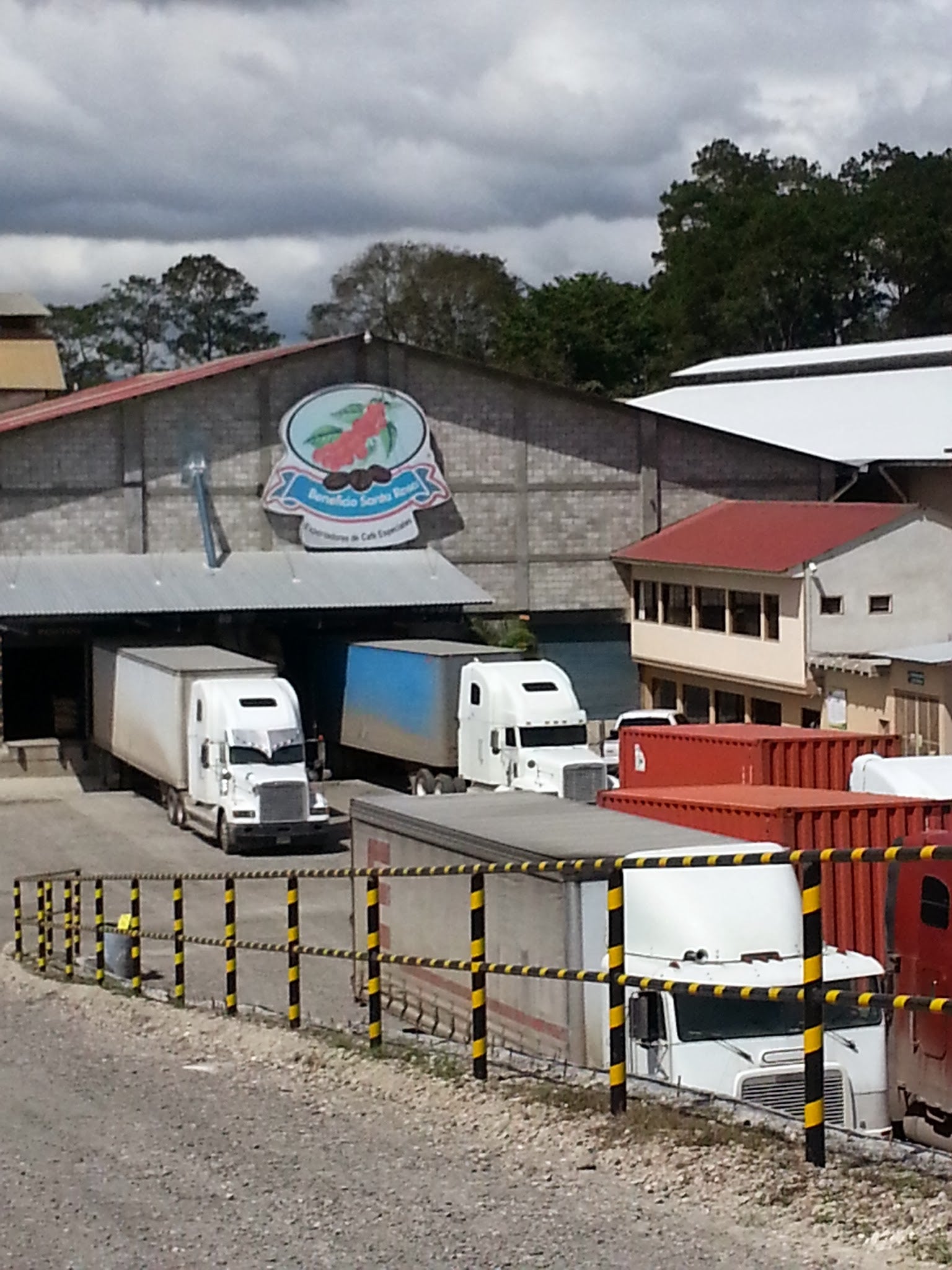A report from Emeran in the field on Sunday, February 9.
Beneficio Santa Rosa was started in the early 2000s by a producer who wanted to start milling his own coffee. It grew from there and more farmers were using his mill. In 2004 a handful of other people invested to grow the wet mill. The growth has been tremendous, especially over the past two years. They are continuing to expand the facility by opening a new drying building, and are constructing a new office building and a local cafe to showcase the local coffee.
 Jeny was my guide for the visit. She has worked at the Beneficio for the past two years and is now in love with coffee. She wholly believes in the owner group: their sincere care for the local producing population and the sustainably of the Honduran coffee industry. She specifically deals with export logistics. However, that entails receiving wet parchment coffee based on the contact date and getting it processed in a timely manner for export. As a young female in a male dominated industry, she has had to assert herself to be heard and respected. If coffee does not meet expected quality or is delayed for shipping, or is not shipped according to the instructions from the buyer, she is responsible. She is proud of her work and wants Honduran coffee to become assocated with quality on the world market.
Jeny was my guide for the visit. She has worked at the Beneficio for the past two years and is now in love with coffee. She wholly believes in the owner group: their sincere care for the local producing population and the sustainably of the Honduran coffee industry. She specifically deals with export logistics. However, that entails receiving wet parchment coffee based on the contact date and getting it processed in a timely manner for export. As a young female in a male dominated industry, she has had to assert herself to be heard and respected. If coffee does not meet expected quality or is delayed for shipping, or is not shipped according to the instructions from the buyer, she is responsible. She is proud of her work and wants Honduran coffee to become assocated with quality on the world market.
he Beneficio has several certifications including certified organic and fair trade. They believe the specialty coffee market is important to the future of Honduran coffee. That means tight quality control in all stages of processing. They have invested in equipment that affords them the high quality they demand along with the quality control to keep it regulated. Not only that, they invest in sustainable energy. They recycle the parchment and dropped beans through a conveyor system to the furnaces they use for the mechanical dryers.
All along the process, the beans are measured for quality via sample roasts. I had a chance to cup 8 micro lot coffees coming from 4 growing regions. The micro lots are wet processed by the producer and brought in dried. The samples ranges from seven to more than 60 bags. There were two that stood out, but most had an intense flavor with flora, cherry, peach and orange notes. The QC department, lead by Margarita, will send out samples to brokers in hopes of selling it soon. Who knows, maybe I will buy some.
I had a chance to ask Jeny and Jony some questions about what they see as opportunities and challenges for Honduran coffee. Both agree that fair trade organic (FTO) is necessary for the industry to maintain and grow. They have seen firsthand the benefits of fair trade. Although the license is demanding from a logistics and cultural side, they have seen how the producers have really benefitted, with agricultural assistance, loans, doctors, schools, and pride in quality which translates to more money.
Adalid is the certification inspector in the field, making sure the producers are following the requirements. He works for the Beneficio and assists the producers in getting the licenses as well as keeping them. He also agrees that fair trade is one of the most important necessities for long term sustainability and growth. Another area of focus is micro lots. As that market grows, they want keep in pace. Micro lots bring in more money for the producer, which in turn allows them to invest in the trees and land.
Some of the challenges they encounter are Honduran contraband coffee being transported to Guatemala and sold on the world market as Guatemalan coffee. This happens because Guatemalan coffee has a better reputation and fetches more money. It under minds the entire system and cheats the Honduran market of quality coffee.
Another big problem is overcoming tradition and culture. Coffee has been grown for generations, and it is hard to change mindsets, mainly about proactively managing the trees. Roya coffee rust hit the country hard, and it could have been significantly less severe had the producer heeded the advice of the Beneficio sooner. Of course, the advice was to cut down the trees that had the rust, so it would not spread, but that meant losing production for at least three years. So most producers did not follow the advice and lost their entire crop instead of only a fee trees. The hope is that going forward, they will pay closer attention to the advice and take the necessary steps to maintain or even improve the quality for years to come. Although, even now, some farmers have yet to cut down the Roya infected trees, meaning they are putting all their neighbors at risk since it is so contagious.
The Beneficio is counting on peer pressure, which is a traditional means of change. If a neighbor takes the risk to fertilize and it pays off, then they may be more willing to follow suit. Money drives all decisions and it is hard to make long-term decisions when your family needs food now. The fair trade and Beneficio loans are extremely important in giving the producers the cushion to make some of these long term decisions, as well as be a safety net when they cut down their trees to prevent the spread of Roya.


